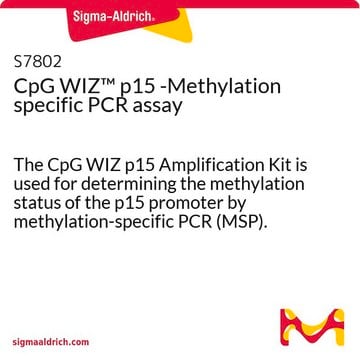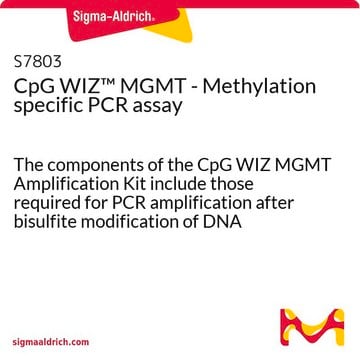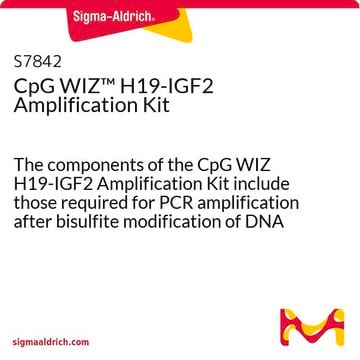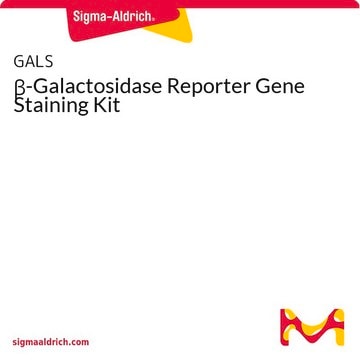S7806
CpG WIZ™ Prader-Willi/Angelman -Methylation specific PCR assay
The CpG WIZ Prader-Willi/Angelman Amplification Kit is used for determining the methylation status of this region by methylation-specific PCR (MSP).
Sign Into View Organizational & Contract Pricing
All Photos(1)
About This Item
UNSPSC Code:
12161503
eCl@ss:
32161000
NACRES:
NA.31
Recommended Products
Quality Level
species reactivity
human
manufacturer/tradename
CPGWIZ™
Chemicon®
technique(s)
PCR: suitable
NCBI accession no.
UniProt accession no.
application(s)
genomic analysis
shipped in
dry ice
Gene Information
human ... NIPA1(123606)
Related Categories
General description
A differentially methylated site exists in the CpG islands of SNRPN (small nuclear ribonucleoprotein-associated polypeptide N), a candidate gene for Prader-Willi/Angelman Syndrome. Normally, this site is methylated and inactive on the maternal homolog and unmethylated and transcriptionally active on the paternal homolog. In research samples from Prader-Willi individuals, only the methylated allele is present, while samples from Angelman Syndrome (AS) individuals contain only the unmethlyated allele. The CpG WIZ Prader-Willi/Angelman Amplification Kit is used for determining the methylation status of this region by methylation -specific PCR (MSP). The kit contains primers targeted to the CpG island on the SNRPN gene. PCR parameters have been identified such that both primer sets in the kit amplify template under the same conditions. Normal control genomic DNA, which will generate a product with both primer sets, is also included.
Methylation-specific PCR (MSP) is a new technology for sensitive detection of abnormal gene methylation utilizing small amounts of DNA (Herman, 1996 ). This process employs an initial bisulfite reaction to modify the DNA, followed by PCR amplification with specific primers designed to distinguish methylated from unmethylated DNA.
Methylation-specific PCR (MSP) is a new technology for sensitive detection of abnormal gene methylation utilizing small amounts of DNA (Herman, 1996 ). This process employs an initial bisulfite reaction to modify the DNA, followed by PCR amplification with specific primers designed to distinguish methylated from unmethylated DNA.
Application
Principles of the Technique
Use of either the CpGenome DNA Modification Kit (Cat. No. S7820) or the CpGENOME Fast DNA Modification Kit (Cat. No. S7824) facilitates the initial bisulfite reactions, while the CpG Wiz Prader-Willi/Angelman Amplification Kit contains the reagents required for the gene-specific PCR amplification reactions.
Use of either the CpGenome DNA Modification Kit (Cat. No. S7820) or the CpGENOME Fast DNA Modification Kit (Cat. No. S7824) facilitates the initial bisulfite reactions, while the CpG Wiz Prader-Willi/Angelman Amplification Kit contains the reagents required for the gene-specific PCR amplification reactions.
Legal Information
CHEMICON is a registered trademark of Merck KGaA, Darmstadt, Germany
CPGWIZ is a trademark of Merck KGaA, Darmstadt, Germany
Disclaimer
Unless otherwise stated in our catalog or other company documentation accompanying the product(s), our products are intended for research use only and are not to be used for any other purpose, which includes but is not limited to, unauthorized commercial uses, in vitro diagnostic uses, ex vivo or in vivo therapeutic uses or any type of consumption or application to humans or animals.
Storage Class Code
10 - Combustible liquids
Certificates of Analysis (COA)
Search for Certificates of Analysis (COA) by entering the products Lot/Batch Number. Lot and Batch Numbers can be found on a product’s label following the words ‘Lot’ or ‘Batch’.
Already Own This Product?
Find documentation for the products that you have recently purchased in the Document Library.
Yen-Liang Liu et al.
Biophysical journal, 111(10), 2214-2227 (2016-11-17)
Whereas important discoveries made by single-particle tracking have changed our view of the plasma membrane organization and motor protein dynamics in the past three decades, experimental studies of intracellular processes using single-particle tracking are rather scarce because of the lack
Yen-Liang Liu et al.
Cancers, 11(12) (2019-12-07)
Advanced prostate cancer is a very heterogeneous disease reflecting in diverse regulations of oncogenic signaling pathways. Aberrant spatial dynamics of epidermal growth factor receptor (EGFR) promote their dimerization and clustering, leading to constitutive activation in oncogenesis. The EphB2 and Src
Our team of scientists has experience in all areas of research including Life Science, Material Science, Chemical Synthesis, Chromatography, Analytical and many others.
Contact Technical Service







